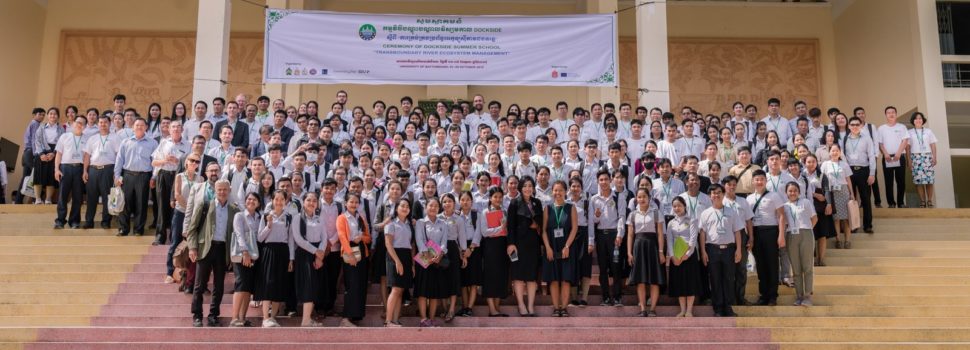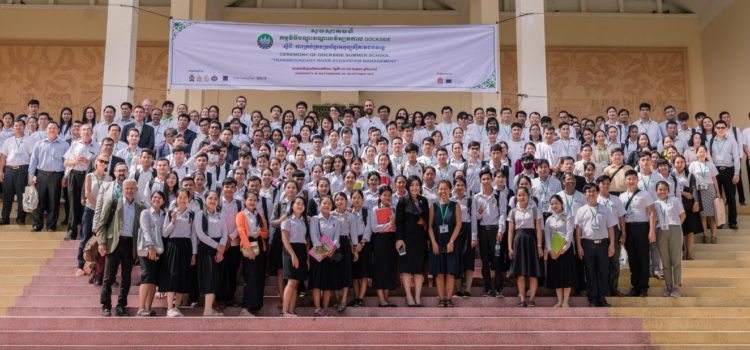

CLOSED Call for Application: Summer School and ASEAN Water Platform 2019
National University of ManagementNewsSummer School 2019 6 May 2019

Summer School and ASEAN Water Platform 2019
National University of Management (NUM)
WATER AND ITS MANY ISSUES.
METHODS AND CROSS-CUTTING ANALYSIS (2)
Phnom Penh, July 05th-13th
Following Summer School 2018 at University of Battambang last year, DOCKSIDE Project is pleased to announce that Summer School 2019 will be coming soon. It will be held at National University of Management (NUM) from 5th – 13th July 2019. This year Summer School will be organized jointly between two Erasmus+ Capacity-building projects coordinated by University of Nantes, named DOCKSIDE and WANASEA,with the participation of more than 100 Asian young researchers and European visiting scholars
The first DOCKSIDE Summer School objectives are to increase the students’ and researchers’ knowledge and to enable connectedness between them as well as to expand the Environmental Maritime Research (EMR) network, and to increase scientific collaboration.
In order to achieve those goals, Summer School relies on the following working principles:
- Transfer of methodological tools;
- Multidisciplinary approaches (social sciences, sciences);
- Good balance between theories and practical work;
- Interactivity among participants;
- Disseminate knowledge;
- Build a collaborative network (academic and non-academic);
- Intercultural exchanges.
Summer School and ASEAN Water Platform 2019 PLENARY SESSIONS (Sunway Hotel, Phnom Penh)
Friday, July 5th
What Role for a Development Bank in the Improvement of the Urban Water Supply and Sanitation Services? The Case of AFD in ASEAN, French Development Agency (Phnom Penh)
At the heart of sustainable development issues, access to water and sanitation is recognized as a human right by the United Nations since 2010. It is also a key driver for a greener growth. In the context of accelerated urban growth and demographics in many developing countries, ensuring access to water and sanitation is a significant challenge. In response, the Agence Française de Développement (AFD) finances the construction and the rehabilitation of drinking water production and distribution infrastructures, as well as the construction of infrastructures that improve and extend sanitation services. Particularly vigilant to the sustainability of the infrastructures it finances, AFD works in close collaboration with its partners to ensure the quality and sustainability of water and sanitation services. It also ensures that they are accessible to everyone, including the poor. This strategy will be described through the presentation of our interventions on concrete projects in the countries of the area.
Development of Maritime Policy in ASEAN and Comparison with EU, Ruth Banomyong (Thammasat University)
Maritime policy is defined as the area of private and public policy concerned with the economics of maritime transport, ports and terminals; national and international regulation; maritime security and defence; maritime labour; oceanic law, policy and management.Maritime issues raise common challenges in terms of maritime spatial planning, maritime safety, sustainable maritime transport, or the role of ports in the socio-economic development of countries and regions. There exist numerous issues related to accessibility, interoperability of costal and marine data, funding for building effective infrastructure, and for implementing cooperation actions.
The purpose of the plenary presentation is to provide audience with insights into the formulation of maritime policies at the ASEAN level while contrasting with the EU experience of maritime policy development.
Knowing and Governing Water, Pierre-Yves Le Meur, Anthropologist, IRD-GRED
Water is everywhere; it is a primordial need and a component of all living beings. However, it is also a scarce resource, subject to competition, conflicts and various processes of appropriation and commoditization. Water has also become a sort of chemical abstraction (H2O) integrated – “disciplined” – in large-scale socio-technical networks and infrastructural apparatuses. However, beyond the abstraction, water has its own materiality made of fluidity and mobility, water crosses spatial and physical boundaries, conveys values, and establishes ties with various human and non-human entities. One can thus see water as endowed with agency, and even spirituality, or legal personality, as in the case of the Wanganui River in New Zealand. This contribution will explore these intricate dimensions and the different ways of knowing and governing water by drawing upon illustrations from the Asia-Pacific region.
Saturday, July 6th
Restitution of Research Programs:
- Valuation of ecosystem services of mangrove forests in Cambodia, Sophak Pok (Royal University of Agriculture), Pierre-Alexandre Mahieu (UN)
- Equitable, reasonable and sustainable use of water resources in Cambodia, Tob Chann Aun (IFReDI/MAFF), Laura Movilla (Vigo)
Knowledge and Development: From Principles to Practice, Benjamin Buclet, Center for Research and Education for Development (CREED)
In theory and in principle, the role of knowledge in development processes is well established: in its various forms, knowledge gives power to individuals and societies. It enables them to make informed choices about their future and, ideally, to realize their potential. For development institutions, as for most non-governmental organizations and think tanks, knowledge is one of the pillars of development – arguably the most important.
In practice, that is, in the implementation of development projects based on the production of knowledge, it is more complicated. First, the constraints related to the professional practice of research on the one hand and development on the other, are sometimes not very compatible. Secondly, the digital revolution and the profound changes in the knowledge market associated with it have led to a questioning of the legitimacy of traditional knowledge producers, higher education and research institutions in the foreground. Finally, the generalization of the market economy and its application to all sectors of activity have direct effects on the competition between those who promote knowledge and those whose economic, financial or political benefits are based, precisely, on ignorance.
MATERIALS FOR DOWNLOAD
Workshop 1_Transboundary River Management and Water Governance
Workshop 2_Development of Maritime Policy in ASEAN and comparison with EU
Workshop 3_Water Urban Risks_Designing Evacuation Strategies in Case of Flooding with Agent-Based Modeling and GAMA
Workshop 4_Non-Conventional Water Resources_Wastewater Reclamation and Reuse
Workshop 5_Field Research – Qualitative Methodologies in Social Science
Application Form Summer School 2019
